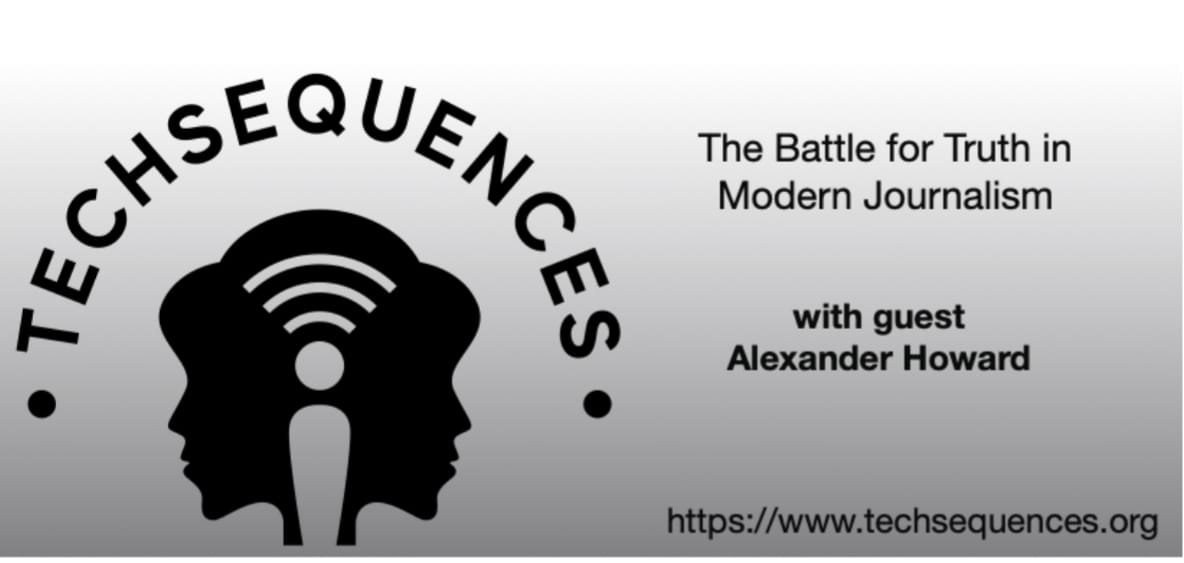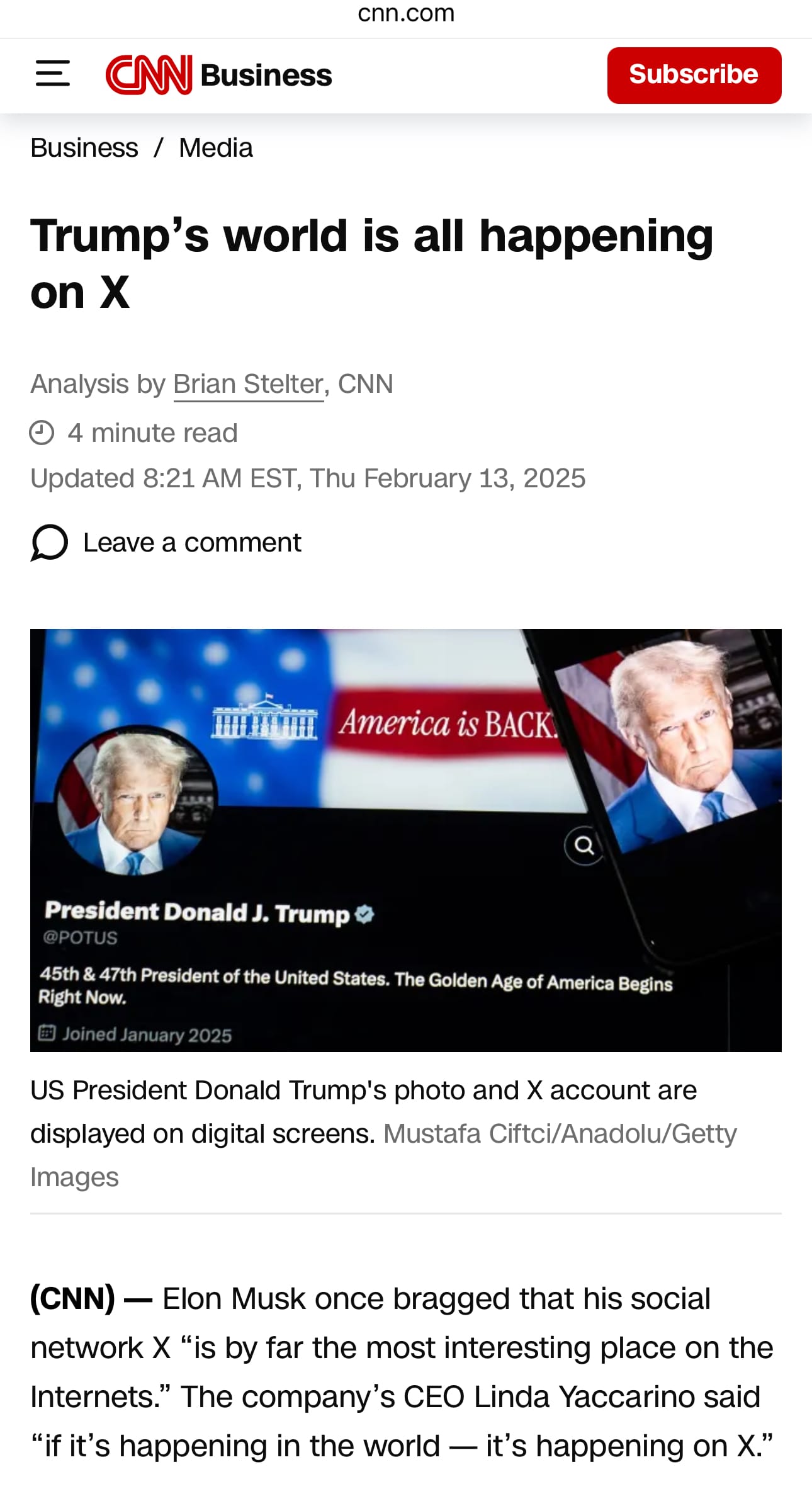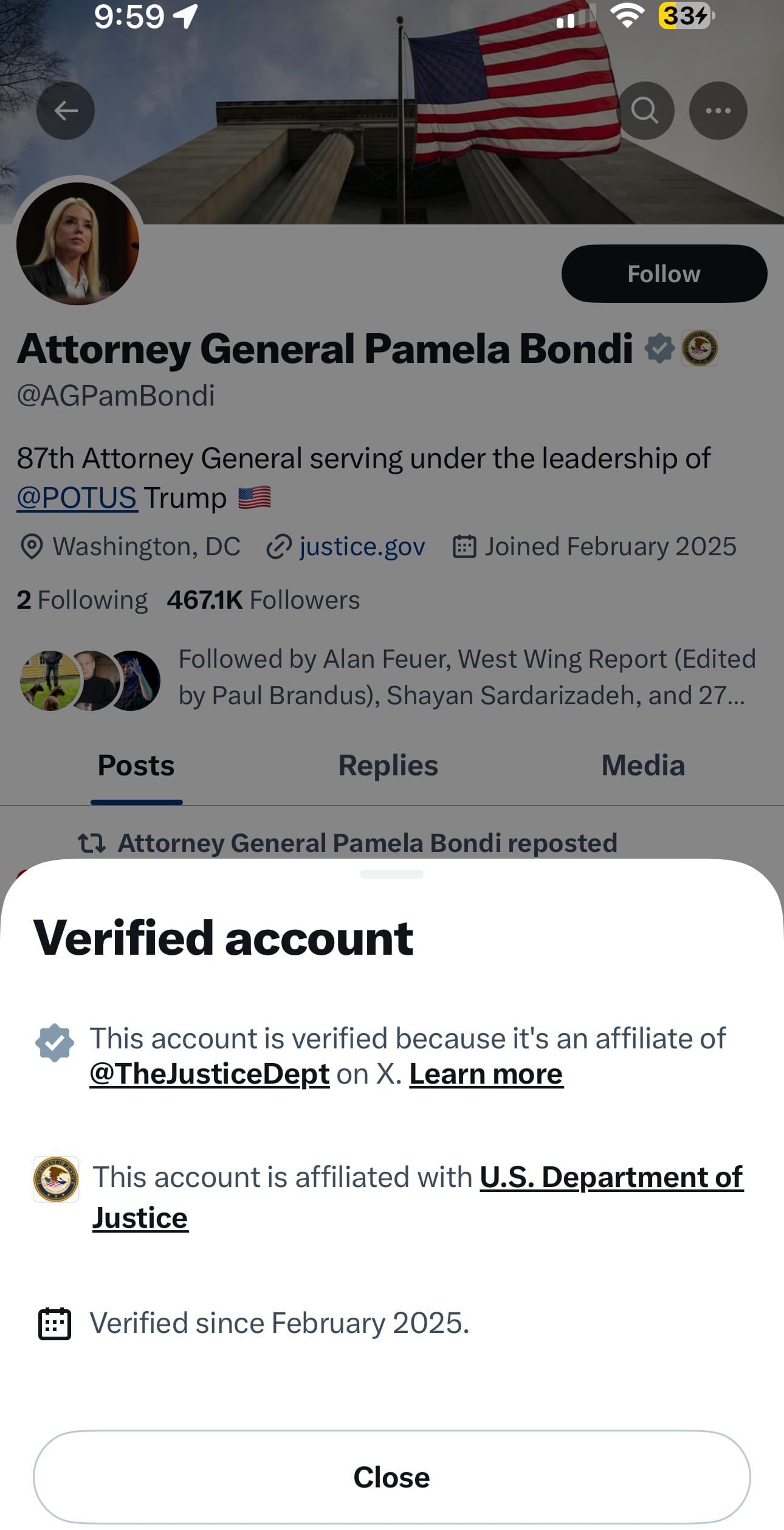The Truman Committee showed Americans why Congress must not ignore the world’s wealthiest “dollar a year man” at DOGE

Good afternoon from Washington, where yesterday’s snowfall is melting faster than ethics standards and watchdogs in the Trump administration.
Glad to see more folks subscribing to Civic Texts today: thank you. Please consider upgrading to a paid membership if you are able, or let me know alex@governing.digital what I need to do to earn your support
Dear POTUS: Please reinstate AOTUS 📪
On Tuesday, I joined a bipartisan coalition of nonprofits, journalists, archivists, and librarians on a letter to President Trump protesting the unwarranted firing of Archivist of the United States Colleen Shogan and urging the White House to reaffirm the independent, professional stewardship of the National Archives. (No answer, yet.)

New podcast!
If you’d like to hear me speak at length, I joined the TechSequences podcast to talk about data, journalism, and the battle for truth in a hot dis/information war. (MP3)
Today’s journalists use sophisticated tools to scrape, analyze, and visualize complex datasets, transforming investigative reporting across fields like political corruption and climate change. Yet this technological evolution comes at a critical moment when major tech platforms are scaling back fact-checking, making data-driven journalism even more crucial to maintaining public trust. From “Democracy Dies in Darkness” to “Riveting storytelling for all of America,” the recent shift in Washington Post’s mission indicates that journalism may be at a critical crossroad. How can we ensure rigorous reporting in an era of rapid content production? What standards should govern AI journalism? And can journalistic integrity survive as tech platforms retreat from fact-checking?
Hosted by: Alexa Raad and Leslie Daigle.
Further reading:
Has the Tide Turned for TikTok, Telegram and X?The Art and Science of Data-Driven Journalism
The Washington Post’s New Mission: Reach ‘All of America’
A Pulitzer winner quits ‘Washington Post’ after a cartoon on Bezos is killed
Meta Ditches Fact-Checks For X-Style Community Notes—Zuckerberg Says It Will Restore ‘Free Expression’
Spoiler alert: facts are losing. We all need to tell better stories to defend democracy.
Why transparency for the world’s wealthiest “$1/year man” is crucial

Last week, venture capitalist Chamath Palihapitiya claimed on X that the United States “DOGE Service” President Trump ordered has existed twice before, citing President Clinton’s “National Partnership for Reinventing Government” and the “Truman Committee.”
He’s mistaken, as I responded at length.
In one precedent cited, the upper chamber of the legislative branch voted to empower Senators to use their oversight powers to investigate the executive branch, not a renamed technology division in the White House created by a president.
The Senate Special Committee to Investigate the National Defense Program — aka the “Truman Committee” — was created by Senate Resolution 71, sponsored by then-Senator Truman. The bill unanimously passed on March 1, 1941.

The Committee investigated war profiteering during World War II, conducted public hearings, and issued reports on fraud, waste, & abuse that saved taxpayers billions of dollars that could be applied to winning an existential conflict against the fascist regime that had consequered almost all of Europe.
Unlike DOGE, the Committee never sought to impound funds appropriated by Congress, nor unilaterally to “delete” agencies Congress has created nor removed public data from. public access.
The other precedent cited, the National Performance Review, was in the executive branch. VP Al Gore and a team of hundreds of government workers canvassed government agencies for six months and then made around 1200 recommendations to reinvent government in a massive report to the President, about two thirds of which were subsequently adopted.
But unlike Elon Musk, Gore never demonized civil servants, unilaterally deleted grants or funding, nor described any federal agency as “evil.” To the contrary, Gore recognized the "talented federal employees” who contributed to the report, “bringing their experience and insight to a difficult and urgent task.”
What I didn’t dwell on in my reply to Palihapitiya is that the key historical precedent of the United States DOGE Service isn’t the Truman Committee that the then-Senator to rode to national fame and then presidency after Franklin D. Roosevelt passed away.

It’s the War Production Board, which came under the Truman Committee’s scrutiny for its policy of hiring “dollar-a-year men” to staff government agencies.
As the Senate history recounts, “employed by the government for a dollar a year, these men continued to draw salaries from the nation's largest corporations.
The committee suspected a conflict of interest, concluding the executives were ‘unable to divorce themselves from their subconscious gravitation to their own industries’ and suggested that their loyalties delayed maximum war production.”
Sound familiar?
One of the insights gained from that era is that “special government employees” who serve on advisory committees, commissions, or the DOGE Service must be bound by ethics laws, including those that prevent conflicts of interest in positions of official power.
To serve as SGE, Trump must have given Elon Musk an ethics waiver — but the new White House press secretary suggested Musk will police himself. It's ludicrous.
This is not just about disclosures, but potentially an ethics agreement that acknowledges all assets and conflicts — a defense contractor has them — and either divests or recuses. Eric Lipton has a fantastic explanation of the situation, including the legal and ethical context. (Gift article.) His key takeaway: “Ethics laws make it a federal criminal offense to take actions that benefit family businesses — even for so-called special government employees, unless a waiver is issued.”
As the Office of Government Ethics says, “Public service is a public trust.” All Americans who wish to earn and keep public trust always disclose their conflicts of interest and divest from them — avoiding even the appearance of corruption in serving our government of the people. They do their public work in daylight in collaboration with Congress, not shrouded in secrecy, whenever possible.
Musk promised “maximum transparency,“ but if the American people visit the new doge.gov, the About page leads to an executive order at the White House website. There is no transparency about who works there. Instead, there is a river of of tweets.
The DOGE Service was placed in the White House, out of reach of the Freedom of Information Act until 2034. At agencies, DOGE Service staff have been told to do to avoid generating public records subject to it.
None of these choices are designed for transparency and accountability necessary to ensure public trust, much less Musk’s false assertion that disclosing the names of government workers is “criminal” or attacks on the agency and civil servants entrusted with global diplomacy, development, and democracy by Congress.
The United States government and the people it serves now risk dire damage to our union if the Senate does not create a committee to oversee Musk and the DOGE Service, ensuring constitutional checks and balance are not an afterthought. We must learn from the past to avoid repeating the worst mistakes of the 20th century. What’s past is prologue.

What was missing from CNN’s analysis of X
One of my frequent frustrations with news media coverage is when beat political or media reporters cover technology, or when tech reporters cover government. (Much of the best coverage of the DOGE Service has come from Wired, where a unified newsroom is combining these beats.)
Today, I was aggravated by what I didn’t see in an analysis Brian Stelter wrote for CNN about how Trump and his administration are using X to create the illusion of transparency and false beliefs conspiracies fueled by grievance and retribution validated by the President of the United States. Good governance, it’s not. Other voids:
Analysis of how much money US government now pays Musk for “verified” organizational accounts & advertising – which are unknown! (More below.)
-How officials & agencies “going direct” can undermine news media, including CNN, with official propaganda at scale. (This is true on Meta & Alphabet platforms, too.)
Musk’s overt hatred of press & civil servants, who he calls “evil,” and the chilling effects of his directing state/corporate power towards reporters on the platform, including false claims that journalists are liars or criminals for reporting on DOGE staff and actions.
The impact on creation or retention of public records retained and discoverable for the Freedom of Information Act or Presidential Records Act solely on X. Remember, Musk deleted a decade of records in the 18F X account.
The First Amendment implications of US officials creating forums for protected speech on X with official statements that “special government employee” Musk can deny that access to press and citizens whenever he wants with suspensions, blocks, and bans which violate the First Amendment rights of Americans.
First principles: Official U.S. government communications should always be cross-posted in an accessible format to a .gov website so no American has to sign up for a commercial service nor agree to Terms of Service to read laws, court rulings, orders, or other edicts of government.
How we got here: While the Department of State and Department of Defense both opted for “organizations” & “affiliates” during the Biden administration, policy for US government use of X after Musk acquired it and began changing features, staffing, focus and core code was opaque, haphazard, & ineffective — and that was before he went all in on re-electing Trump, including focusing attention on X.
Now government agency “Organizations” and affiliates are much more widespread on X, most notably at the White House and the Justice Department.

Biden White House officials kept making unique use of same platform they asserted to media “on background” wasn’t “real.” Musk unverified agencies & officials without consequences or pushback on deboosting official accounts during wars, natural disasters, elections, & the next pandemic.
-What’s next. The core insight of the moment is that we are not just seeing state power on social media but the emergence of state social media that will superchange propaganda campaigns, crowding out journalism and drowning democracies in a tsunami of bogosity.
In contrast, sociology professor Tressie McMillan Cottom nails this dynamic in her recent column instead of being dazzled by the big show on the small screens.
…all of Musk’s preening on social media obscures what is actually happening. That is what content is really good at doing. It feels transparent to see an influencer bake bread in her grandma chic retro kitchen or to see a billionaire storm a corporate headquarters to vanquish his enemies to unemployment. But content does not reveal the machinery of influencing — the deals signed, the NDAs issued, the metrics used to measure the dollar value of the audience’s emotional response. In politics, content can hide the money and power at play.
Why Trump and Musk are wrong about remote work
Let’s talk about remote work. I have worked remotely in multiple jobs since 2006, including fully virtual distributed organizations and hybrid workplaces. I worked my tail off, & so did my coworkers.
Federal mandates to return to the office will disproportionately affect women, people who are chronically ill, immune-compromised, or anyone who has caretaking responsibilities for elders or disabled family members. It will immediately result in attrition from the most talented workers who have these considerations and choose remote work because they need the flexibility, including working parents.
Yesterday, President Trump firmly took the side of the 20th century, declaring that “I happen to be a believer that you have to go to work. I don’t think you can work from home.”
Nobody’s going to work from home, they’re going to be going out, they’re gonna play tennis, they’re gonna play golf. They’re gonna do a lot of things—they’re not working. It’s a rare person that’s going to work. You might work 10% of the time, maybe 20%, I don’t think you’re going to work a lot more than that.
Trump’s comments may reflect what he does when he “works from club” but not the “results-oriented work environment” all Americans should want to see in lean, effective, & efficient agencies.
We should all want reformed and reoriented towards 21st century governance and operations, where officials and staff can securely log on to Internet-connected devices around the world to collaborate and get public business done.




